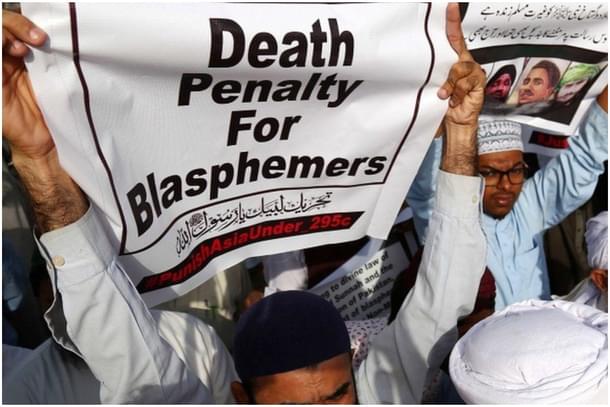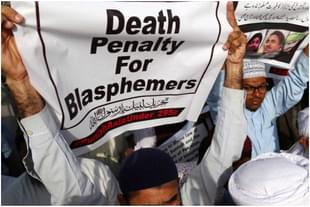Politics
Pakistan: Woman School Principal Gets Death Sentence Under Blasphemy Law For Denying Finality Of Prophethood
Swarajya Staff
Sep 28, 2021, 11:32 AM | Updated 11:32 AM IST
Save & read from anywhere!
Bookmark stories for easy access on any device or the Swarajya app.


A woman school principal has become the latest convict under the harsh blasphemy laws of Pakistan and duly given death sentence, Pakistan daily The Dawn, along with several other publications, has reported.
The woman, a Muslim, was booked under Section 295C of the Pakistan Penal Code (PPC) in September 2013. The Section makes derogatory remarks against Mohammed a criminal offence and carries the death punishment.
The woman, Salma Tanveer, is owner and principal of a private school near Lahore.
She was booked on the complaint by a local Khateeb (prayer leader), Qari Iftikhar Raza, who said that Salma had distributed pamphlets of her writing where she denied the finality of prophethood (“denied khatam-e-nubuwat”) and claimed herself as a prophet (“claimed her own nubuwat”).
The Dawn has quoted an excerpt from the verdict by Lahore Additional District and Sessions Judge.
“It is proved beyond reasonable doubt that accused Salma Tanveer wrote and distributed the writings which are derogatory in respect of Holy Prophet Muhammad (PBUH) and she failed to prove that her case falls in exception provided by section 84 of PPC,” the verdict said.
Section 84 of the PPC deals with offences committed by a person of unsound mind.
The primary argument by Salma’s advocate was that she was of unsound mind at the time of the incident. The State prosecutor, on the other hand, said that Salma failed to be prove that she was incapable of knowing the nature of her act at the time of writing and distributing the “blasphemous” material.
The judge said that given Salma was running a school all by herself, she could not have been of unsound mind.
“The convict Salma Tanveer is sentenced to death and fined Rs 50,000 u/s 295-C of PPC,” said the verdict, as per the report.
Pakistan’s Samaa TV reported that the verdict adds that the death sentence cannot be executed without confirmation by the Lahore High Court.
Here’s a little background of Pakistan’s blasphemy laws: Section 295A was enacted by the British in undivided India in 1927 making ‘deliberately’ offending religious sentiments a criminal offence. Both India and Pakistan inherited the laws post partition. The Pakistan government, however, went on to add 295B and 295C in the 1980s. While Section 295B makes defiling of the Quran an offence punishable by life in prison, Section 295C makes ‘derogatory’ remarks against Mohammed punishable by death.
It’s pertinent to mention here that blasphemy laws in Pakistan, especially 295C, are routinely misused to harass citizens and to get back at them. Non-Muslims in Pakistan have been reported to be disproportionate victims of such accusations.
However, while many have been given the death sentence for insulting Mohammed, no one has really been executed, as higher courts overturn or commute the sentences given by lower courts.
This, however, does not stop fanatics from taking law into their own hands.
Since 1992, at least 52 people facing blasphemy charges have been extra-judicially killed in Pakistan.
In August 2021, an eight-year-old Hindu boy was booked for blasphemy, becoming the youngest accused in Pakistan of such a crime. However, the Pakistan police dropped the charges against him after global outrage.
The boy had reportedly wandered into a madrassa and, terrified to see the maulvi, urinated in the premises. He was accused of desecrating the religious place.
Violence over blasphemy remains an alarming issue in India as well and, of late, Muslims in India have begun to demand a special law against insult to Mohammed on the lines of Pakistan.
In the run-up to Partition, several Hindu leaders, particularly those from the Arya Samaj, were killed by Muslim fanatics for blasphemy of Mohammed.
The murderer of Mahashay Rajpal in the 1920s is hailed in Pakistan as a “ghazi” and has streets and buildings named after him.
Such cases have continued in India post Partition too. In recent years, the most shocking case that emerged has been of Uttar Pradesh resident Kamlesh Tiwari, who was hacked and shot to death in his office in 2019.
In 2010, a college professor from Kerala, TJ Joseph, was brutally attacked by a group of fanatics acting on a fatwa to chop off his limbs. The professor escaped death, but was left with his hand completely severed from his arm.
Doctors however managed to sew it back.
Despite the murder attempt on him, the professor faced trial for blasphemy. He was acquitted of the charges.





